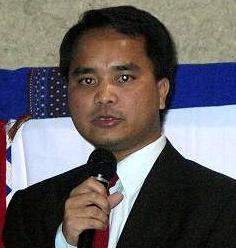|
Interests often dictate an individual or a nation in shaping diplomatic relations with others. Neither the world's lone superpower nor a dictatorial regime like Burma is an exception. Interests can be manifold: economic interest, political interest and strategic interest, among others. These interests are coupled by one's national security.
At a meeting on June 5, 2007, the chairman of National Convention Convening Commission announced that the convention final phase would resume on July 18, 2007, following its adjournment since December 29, 2006.
Lt-Gen Thein Sein said, "The government is constantly implementing the roadmap for a smooth transition to a peaceful, modern and developed discipline-flourishing democratic state."
A week later on the 12th, a group of bipartisan US senators, Mitch McConnell and Dianne Feinstein, joined by Patrick Leahy, John McCain, Sam Brownback and Barack Obama, introduced legislation to renew economic sanctions on Burma.
Both programs are likely to proceed as envisaged. Despite critics calling the national convention a “sham,” the military leadership appears resolute to the seven steps roadmap toward the so-called “disciplined democracy.”
The Burmese Freedom and Democracy Act was signed into law by US President George W Bush on July 28, 2003, in the aftermath of the attack on Aung San Suu Kyi's motorcade at Depeyin on the May 30, 2003. The act freezes the assets of senior Burmese officials and bans virtually all remittances to Burma. The act has been renewed every year since then.
The interest of the military government is to consolidate its foothold and advance the country's democratization process in its own ways. It is also by and large a forgone conclusion that the Western nations will continue to impose sanctions and isolate this Southeast Asian nation, which has over 428,000-man army.
The Western world and Burmese opposition groups will cling to the argument that any outcome of the national convention is illegitimate, and therefore, unacceptable. In other words, the military regime will leave no stone unturned to legitimize itself even if it resorts to coercion.
It is almost certain that Burma will have a general election under the supervision of the generals or officials appointed by them. If the election result goes in favor of the military government, which is very unlikely under a free and fair election, the name of the current regime State Peace and Development Council is expected to be replaced.
As Burma's internal problems are of an ethno-political nature, the military is keen on making excuses along the lines that the country could disintegrate on ethnic lines. In fact, with the nullification of the 1947 Panglong Agreement and the subsequent constitution, all ethnic nationalities of Burma can claim pre-independence status.
However, claiming pre-independence status is likely to create more instability and violence in this volatile nation. Building the Union of Burma would better serve the interests of the different nationalities. To do so, voices of both minority and majority ethnic nationalities need to be heard.
With the gradual development of a democratic struggle, the Burmese people now better understand the pros and cons of different governing systems around the world. Although democracy is not the perfect solution to the country's problems, it will be a hallmark to national reconciliation.
The basic principles of Burma's constitution drafted at the national convention are to frame a unitary or centralized government with ultimate power resting on the army. Conversely, the overwhelming majority of ethnic minorities would opt for a decentralized government of more autonomy in their respective states, administrative divisions and regions.
One other significant factor in the Burmese democratic movement is the role of Aung San Suu Kyi and her National League for Democracy (NLD). There are world leaders who are very concerned about Suu Kyi's safety and freedom. On May 14, world leaders sent a letter to Snr-Gen Than Shwe urging him to release her was a dramatic example.
The more popular the lady is, the longer she might be put under house arrest, unless something unusual occurs. When the world looks on the lady with support, the military regime finds itself more threatened. To the army generals, confining the 62-year-old lady is an effective means of suppressing the democracy movement.
A contrasting interest of the opposition groups and their international supporters: to free Suu Kyi and allow the NLD and other ethnic groups to participate in a transparent convention leading to reconciliation. Unsurprisingly, Suu Kyi's house arrest was extended for another year on May 27.
The Burmese people both inside and outside the country will watch the slow-moving implementation of the seven steps roadmap toward democracy with skepticism and caution. The release of the 1991 Nobel peace laureate from detention before the elections is also a miniscule possibility.
This slow-moving process of democratization is a heavy burden on more than 50 million citizens of Burma.
 |
| Nehginpao Kipgen |
|
Nehginpao Kipgen is the General Secretary of US based Kuki International Forum and a researcher on the rise of political conflicts in modern Burma (1947-2004). The writer contributes regularly to e-pao.net and can be contacted at nehginpao(at)yahoo(dot)com . This article was webcasted on June 20th, 2007.
|








